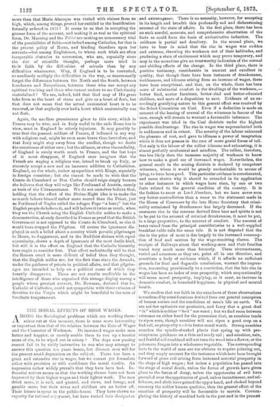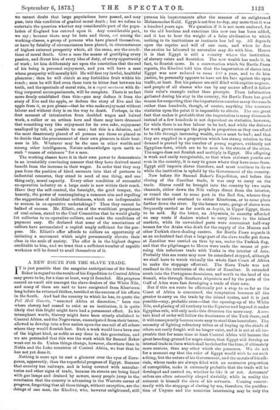THE MORAL EFFECTS OF HIGH WAGES.
A MONG the Sociological problems which are working them- 1.1 selves out at this moment, there is none more interesting or important than that of the relation between the Rate of Wages and the Character of Workmen. Do increased wages make men better and happier, or merely enable them to run up a heavier score of sin, to be wiped out in misery ? The days now passing cannot fail to be richly instructive to one who may attempt to answer this question ten years hence, but discreet men will for the present avoid dogmatism on the subject. There has been a great and extensive rise in wages, but we cannot yet formulate either with precision or with confidence the moral results. An impression rather widely prevails that they have been bad. In- fluential writers assure us that the working classes have not been improved by their higher wages and their lighter work. The men drink more, it is said, and quarrel, and curse, and lounge, and gamble more, but their wives and children are no better off. Their leisure is spent in the public-house. They have shown no capacity for rational enjoyment, but have rushed into dissipation
and extravagance. There is no necessity, however, for accepting in its length and breadth this profoundly sad and disheartening account of the state of affairs. In the first place, there has been no such careful, accurate, and comprehensive observation of the facts as could form the basis of authoritative induction. The evidence is partial and desultory. In the second place, we have to bear in mind that the rise in wages was sudden and extreme, throwing the workmen out of their habitudes, and producing a state of excitement which may prove temporary, and may in the meantime give no trustworthy indication of the normal and abiding effects of the change. In the third place, there is positive testimony, considerable in amount and excellent in quality, that though there have been instances of drunkenness, recklessness, and idleness arising from an increase of wages, these have been exceptional, and that, on the whole, there has been more of substantial comfort in the dwellings of the workmen,— better food, neater furniture, better-clad and better-educated children, and more of a disposition to save. Evidence of an ex- ceedingly gratifying nature to this general effect was received by the Select Committee on Coal. Even if a deduction is made on account of the leaning of several of the witnesses in favour of the men, enough will remain to warrant a favourable inference. The experiment was tried in the Coal districts under the highest possible disadvantage. The rise in wages was unprecedented both in suddenness and in extent. The severity of the labour enhanced the pleasure of rest, and gave to idleness a power of temptation which it does not possess in the case of more genial forms of toil. Not only is the labour of the collier irksome and exhausting, it is almost perfectly mechanical and mindless. The collier, therefore, was less likely than the immense majority of workmen to know how to make a good use of increased wages. Nevertheless, the general result in the mining districts is declared by competent witnesses, whom it would be grossly uncharitable to accuse of lying, to have been good. This particular evidence is corroborated, and cause shown why it should be extended in its application to other instances in which wages have risen, by one or two facts related to the general condition of the country. It is the fashion to sneer at Lord Aberdare, but we have never seen any better contradiction than a sneer to the statement made in the House of Commons by the late Home Secretary that crimi- nality occasioned by drunkenness has largely decreased. If the enormous rise in the revenue derived from beer and spirits is not to be put to the account of criminal drunkenness, it must be put, in a large proportion, to the account of comfort. The amount of taxes raised from the principal contributories to a well-supplied breakfast-table tells the same tale. It is not disputed that the rise in the price of meat is due largely to the increased consump- tion of beef and mutton by the wage-receiving classes. The receipts of Railways attest that working-men and their families travel very much more than formerly. These circumstances, varied and numerous as they are, point all in one direction, and constitute a body of evidence which, if it affords no sufficient grounds for final and dogmatic conclusions, warrant the impres- sion, amounting provisionally to a conviction, that the late rise in wages has been an index of true prosperity, which unquestionably will mean moral prosperity, implying, as it must, an increase in domestic comfort, in household happiness, iu physical and mental health.
We confess that our faith in the soundness of these observations is confirmed by considerations derived from our general conception of human nature and the conditions of man's life on earth. We are neither optimists nor pessimists, and fancy that a great deal " is " which is neither " best" nor worst ; but we find room between extremes on either hand for the persuasion that, as sunshine tends to ripen corn, though sunshine will not ripen a good crop on a bad soil, so prosperity tends to foster moral worth. Strong sunshine scorches the spindle-shanked plants that spring up with pre- sumptuous quickness on a thin and sandy soil ; and sunshine, rain, and fruitful soil combined will not turn the weed into a flower, or the poisonous fungus into a wholesome vegetable. The corresponding facts in the world of man are too obvious to require pointing out, and they amply account for the instances which have been brought forward of gross evil arising from increased material prosperity in the shape of high wages ; but unless a population has passed into the stage of moral death, unless the forces of growth have given place to the forces of decay, unless the appetencies of evil have prevailed over the appetenciea of good, unless incontinence, and sel- fishness, and sloth have gained the upper hand, and choked beyond recovery the nobler human qualities, then the general effect of the sunshine of prosperity will be favourable to morals. Contem- plating the history of mankind both in the past and in the present
we cannot doubt that large populations have passed, and may I pass, into this condition of gradual moral death ; but we refuse to entertain the question whether any considerable part of the popu- lation
of England has entered upon it. Any considerable part,1 we say ; because there may be here and there, not among the working-classes, a group of persons who have placed themselves, or have by fatality of circumstances been placed, in circumstances of highest external prosperity which, all the same, are the condi- tions of moral death. Give a man the means of gratifying every passion, and divest him of every idea of duty, of every opportunity of work ; let him deliberately act upon the conviction that the end of his being is personal enjoyment, and you will have a man whom prosperity will morally kill. He will first try lawful, healthful pleasures ; then be will clutch at any forbidden fruit within his reach ; soon he will find even these turn to bitter dust between his teeth, and the spectacle of moral ruin, in a caput roortuum with fit- ting corporeal accompaniments, will be complete. There is no fact more firmly established than this—you may deduce it from the story of Eve and the apple, or deduce the story of Eve and the apple from it, as you please—that he who seeks enjoyment without labour and without duty is on the way to death. Perhaps, in the first moment of intoxication from doubled wages and halved work, a collier or an artisan here and there may have dreamed that something very like enjoyment for its own sake, enjoyment unalloyed by toil, is possible to man ; but this is a delusion, and -the most disastrously placed of all persons are those so placed as to decide that the procurement of their own pleasure is their busi- ness in life. Whatever may be the case in other worlds and among other intelligences, Nature acknowledges upon earth no such " reason of existence " for a man.
The working classes have it in their own power to demonstrate in an irresistibly convincing manner that they have derived moral -benefit from the increase in their wages. In order that they may pass from the position of hired servants into that of partners in industrial concerns, they stand in need of one thing, and one thing only, moral capacity. Every other condition of successful co-operative industry on a large scale is now within their reach. Have they the self-control, the foresight, the good temper, the honesty, the power of contemplating a common-aim and repelling the suggestions of individual selfishness, which are indispensable to success in co-operative undertakings ? Then they cannot be 'balked of success. Mr. Elliott, one of the wealthiest proprietors -of coal-mines, stated to the Coal Committee that he would gladly -let collieries to co-operative colliers, and make the conditions of payment easy. He declared that some of the associations of colliers have accumulated a capital amply sufficient for the pur- pose. Mr. Elliott's offer affords to colliers an opportunity of initiating a movement which might permanently elevate their -class in the scale of society. The offer is in the highest degree creditable to him, and we trust that a sufficient number of capable -workmen will be found to avail themselves of it.































 Previous page
Previous page